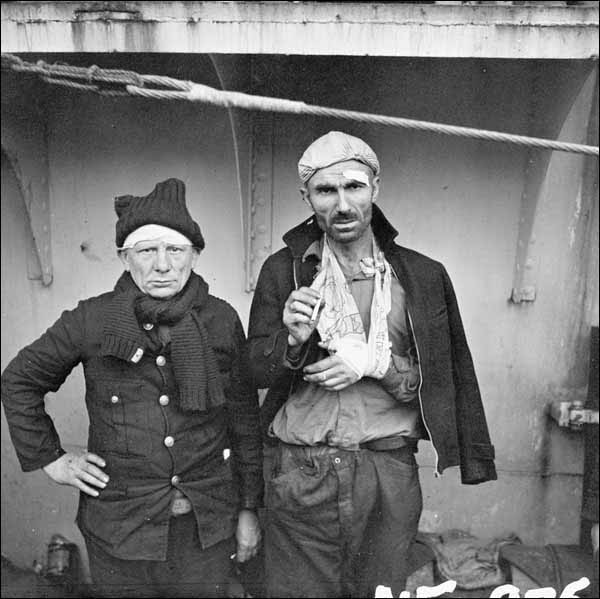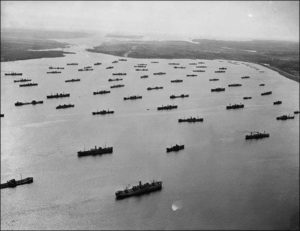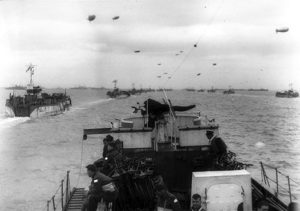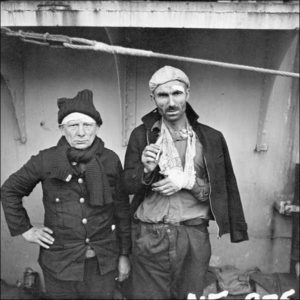


Two unidentified survivors of a torpedoed merchant ship find refuge in St. John's, September 1942. PHOTO: LIBRARY AND ARCHIVES CANADA - PA116455
Two unidentified survivors of a torpedoed merchant ship find refuge in St. John's, September 1942. PHOTO: LIBRARY AND ARCHIVES CANADA - PA116455
When envisioning those who served in the Second World War, many picture the brave men and women, standing tall and proud in their uniforms. Those who served without uniform, specifically, those who answered the call as part of the Canadian Merchant Navy, however, are often forgotten.
The Canadian Merchant Navy was comprised of men and women tasked with the difficult job of faring vital equipment, supplies, and soldiers to Europe and the rest of the world. At the time, many of those who signed up for Canada’s Merchant Navy, were unaware of the “wolf-packs” of German submarines, known as U-boats, which often shadowed and preyed on the Allied convoys, sometimes moments after leaving home port.

These German wolf-packs, under specific directive from Adolf Hitler himself, solely targeted merchant ships, resulting in heavy losses and high mortality rates for merchant crews. There is a famous quote from U.K. Prime Minister Winston Churchill, stating that “the only thing that ever really frightened me during the war was the U-boat peril.”
In total, 12,000 men and women served in Canada’s Merchant Navy, and more than 25,000 merchant ship voyages were made during the war.
The Battle of the Atlantic

The Battle of the Atlantic was one of the only theatres during the Second World War that waged close to continental North America. It began the moment the United Kingdom and France declared war on Nazi Germany on September 3, 1939, and lasted until the total defeat of Nazi Germany on May 8, 1945. The Battle featured relentless attacks from German U-boats against coastal shipping vessels from the Caribbean to Halifax. In some cases, German U-boats penetrated deep into the Gulf of St. Lawrence and launched attacks from the same Canadian waterways our seafarers travel today.
Merchant mariners were deeply impacted during the Battle of the Atlantic, with a casualty rate of one in seven, a casualty percentage higher than any other Canadian fighting corps during the Second World War. A total of 59 Canadian-registered merchant ships were lost, claiming the lives of over 1,500 Canadian sailors, including eight women.

Sadly, only half of all merchant sailors survived the sinking of their ships during the war. The frigid waters of the North Atlantic brought a quick death, usually within five minutes, making the chances of survival one in 100 once a ship went down. Not to mention, ships were often instructed to continue on their missions without stopping for survivors. Despite the dangers, merchant mariners, even those who survived attacks, returned to duty and crewed other ships, knowing all too well the imminent danger lurking in the depths.
Fighting for Recognition
Unbeknownst to many, it wasn’t until 1992 when merchant mariners were granted official status as veterans, making them eligible to receive disability pensions, allowances, and health-care benefits. Unfortunately, retroactive compensation was not provided to the living, despite the absence of benefits since 1945. As a result, in 1998, four Merchant Navy veterans participated in a hunger strike on Parliament Hill, vowing to remain until death or until the federal government approved a new compensation package in lieu of the demobilization benefits provided to Canadian Armed Forces members at the end of the Second World War.
In a famous interview with CBC Radio, Merchant Navy Veteran Ossie Maclean, who protested the absence of benefits on Parliament Hill stated that, “We are the men that saved the world,” and demanded that they receive proper recognition. The protest was successful, and ultimately, the government acted. As the turn of the 20th century began, the government started awarding compensation under the Merchant Navy Special Benefit. In a final act of recognition, in 2003 the Government of Canada declared September 3 as Merchant Navy Veterans’ Day.
We will never forget
As a union that represents Canadian seafarers, every day we fight to protect Canadian sailors and honour the history of the maritime industry. It is with great pride that we recognize and remember the sacrifices of those who served without hesitation during Canada’s, and the world’s time of great need.
Our union roots are deep, and it is for this reason we pause year after year to remember and honour the Canadian men and women who have served our country and fought for freedom around the world. Time may fade, but our memories cannot, we are the Seafarers International Union of Canada, and together, we are stronger!